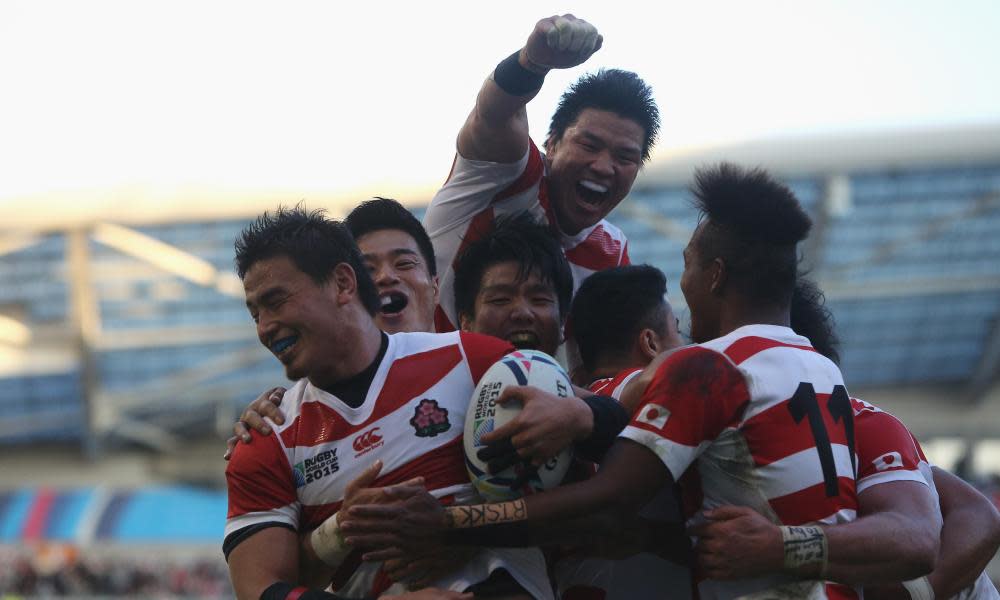Thirteen pounds to play rugby for your country? That’s £13 too much

Rugby fans have been shocked by the recent revelation of the stark contrast between the pay of our England men’s players and that of Saturday’s opposition, Japan. While our men receive £25,000 per match, the Japanese players are paid far less than the minimum wage – the equivalent of £13.64 for a match day’s work.
As a former captain of the England women’s rugby team, I believe this is wrong. I believe that nobody should be paid to play for their country at all.
I have been an ardent supporter of our Red Roses becoming professional, speaking out against our national governing body when it didn’t look as though progress was being made. Finally, times are changing and 28 of our top 15-a-side players will be receiving monthly pay cheques from January. I have been vocal about this because I believe in equality of opportunity: if the men’s team is paid, so too should be the women’s. And I firmly believe that all players should be paid a decent living by their clubs. But other rewards should motivate players at national level – male or female, English or Japanese.
I played for England between 2004 and 2011 without getting paid by my sport. I worked for the majority of that time as a case worker for the police, then as an office manager for a sports centre near Bristol. I didn’t play for money; I played for pride. I aimed for the top because I had a strong desire to reach the next step. I played for England because I loved it. It has given me emotional heartache along the way – but being an amateur “professional” has kept me real.
I remember speaking to the former England prop David Flatman early one morning when my team-mate Sophie Hemming and I were at Bath university completing an early-morning gym session. When Flats asked why we were always there so early, we explained that we had to go to work afterwards. He had no idea. He assumed we were full-time athletes. The biggest thing he had to do that day was to decide when to take his dog for a walk. I also remember beating France away in 2008, and hearing them complain that of course they couldn’t compete against a professional side like us. I was flattered to be mistaken for a well-paid player, but in fact we were not professionals; we just played like we were.
When I deliver key note speeches now to large corporate organisations or to school assemblies, I can do so with credibility because of that fact. I can talk about being an ordinary person doing something extraordinary. I can tell them about the need for determination, resilience, motivation and all the other things that businesses and schools ask us sports people to chat about. I can talk about it because I experienced all of those things by the bucketload. Being paid to represent England would have changed all of that.
It’s all about the question of motivation. Will we get the best out of our elite performers if the reward is cash? Motivation is a very personal thing, and experts are coming to accept that it only works if it comes from within. The author and behavioural economist Dan Ariely has recently devoted a whole book, Payoff, to this very topic. Ariely says that intrinsic motivation – doing a good job for the sake of doing a good job – “can be even more powerful than cash”.
His theory is borne out in top level rugby. The one match that everyone still talks about from the 2015 men’s World Cup is Japan’s victory against South Africa. Internal motivation and desire in that match were visible to all looking on. Japan did not win that day because of any kind of match fee; they won because they had the right motivation. Meanwhile at Twickenham I forked out the equivalent of a month’s mortgage on two tickets to the England v Wales game. I wanted to ask for my money back. It wasn’t that England lost, it was the manner in which they lost. I could see no desire in that performance. I am sure it was there somewhere, but not enough. But all the guys on that pitch that day went home to considerably healthier bank balances. I went home and scraped around to pay my next month’s bills.
I am happy for players to be paid by their club, their bread and butter, and I will continue to campaign for this to happen with the women’s teams too. But fees for national appearances should go back into the grassroots game, the reason that we are all here, and if any player begrudges this then I don’t know if rugby is the sport they should be in. Football is beyond hope, but while we still celebrate and promote the values of our sport, let’s speak volumes with action before we see our egg-shaped ball becoming rounder by the day.
I understand that sport has become a business, but what really is the reason for the money making? Is it to keep 30 to 40 elite players “motivated” by some nice big pay cheques, or is it to ensure that the England rose grows stronger? I know which I think it should be.
• Catherine Spencer was captain of the England women’s rugby team for three years and is the author of the book Mud, Maul, Mascara

 Yahoo News
Yahoo News 